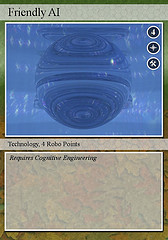 The official Google blog isn’t always the most exciting of reads, but every now and again they post up something worth a read. Today saw the first of ten articles from the top boffins at the Googleplex to celebrate the company’s tenth anniversary; it’s about the future of cloud computing, and it hints at a fairly science fictional end-point:
The official Google blog isn’t always the most exciting of reads, but every now and again they post up something worth a read. Today saw the first of ten articles from the top boffins at the Googleplex to celebrate the company’s tenth anniversary; it’s about the future of cloud computing, and it hints at a fairly science fictional end-point:
Traditionally, systems that solve complicated problems and queries have been called “intelligent”, but compared to earlier approaches in the field of ‘artificial intelligence’, the path that we foresee has important new elements. First of all, this system will operate on an enormous scale with an unprecedented computational power of millions of computers. It will be used by billions of people and learn from an aggregate of potentially trillions of meaningful interactions per day. It will be engineered iteratively, based on a feedback loop of quick changes, evaluation, and adjustments.
Underneath that corporate gloss is the enthusiasm of researchers who believe they’re working toward a useful form of artificial intelligence. This isn’t news, of course – Larry Page has been quite open about that particular long-term goal – but it’s the assured confidence that Google has which never ceases to astonish. From the introduction to the article:
As computer scientist Alan Kay has famously observed, the best way to predict the future is to invent it, so we will be doing our best to make good on our experts’ words every day.
One can’t help but be reminded of the Genius Inventor archetypes of pulp science fiction… but in this case that blue-sky vision is backed up by the bankroll of one of the most powerful organisations on the planet. [image by dannysullivan]
So, is it hubris, hype or hope… or a mixture of all three? Should we fear the Big G, or look to it to usher in something like the Singularity and save us from ourselves? Or is AI just a pipe dream for big-budget geeks?
 The
The  The set of persons who know of the concept of the
The set of persons who know of the concept of the  I expect the majority of Futurismic readers don’t really need an excuse to play computer games, but sometimes its nice to know that what looks like a waste of time is actually doing something productive – in this case, helping to develop artificial intelligence software. [via
I expect the majority of Futurismic readers don’t really need an excuse to play computer games, but sometimes its nice to know that what looks like a waste of time is actually doing something productive – in this case, helping to develop artificial intelligence software. [via